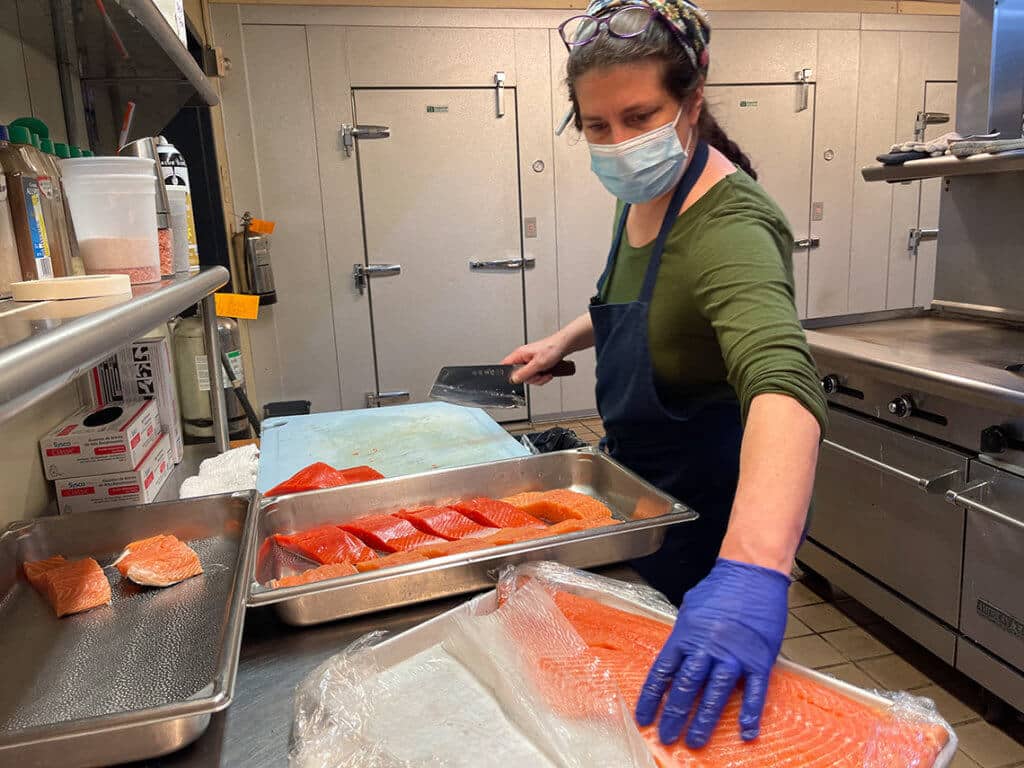by Laura Eshelman
Visitors and newcomers to CooperRiis’s campuses often notice details that differentiate residential life from other treatment programs, but there is one that consistently stands out: the food. The Kitchen Staff at CooperRiis are nothing if not dedicated and innovative, catering to a multitude of different dietary preferences while serving up smiles every day. And that’s not just a figure of speech—menus are intentionally crafted with mental health in mind.

Ingridients
The kitchens at CooperRiis, specifically at the Farm and Asheville locations, prepare meals based on the Mediterranean diet. As the name implies, the Mediterranean diet includes foods commonly found in that region of the world, such as olive oil, fruits and legumes, seafood and poultry, whole grains, nuts, garlic, onions, herbs, and spices. According to Danielle Eavenson, an integrative wellness consultant at CooperRiis Asheville, “The Mediterranean diet is a plant plant-based anti-inflammatory diet which is why we choose to base our menus around it. Besides reducing inflammation, plants provide food for the microbiota in the form of fiber, and micronutrients which are often low in folks with mental health challenges. Free-range organic chicken, wild-caught fish, and grass-fed meats are supportive for brain health, providing essential fatty acids in proper ratios. Unlike fad diets, which often eliminate key food groups such as carbohydrates and fats for rapid weight loss, the Mediterranean diet is well-rounded, sustainable, and supported by scientific evidence to help reduce inflammation.
Inflamation-Good? Bad? Both?
Inflammation refers to the body’s response to unwanted environmental toxins via the production of white blood cells; in other words, it activates the immune system and can be acute or chronic. Acute inflammation tends to resolve itself quickly and with few consequences, whereas chronic (or repeated) inflammation can last for years. Eavenson explains, “Inflammation is an important process of the immune system, protecting us from potential infections and toxins. However, when inflammation does not resolve and becomes chronic, it can lead to damaged tissue, autoimmune disease, and mental health challenges.” Research has linked inflammation to the development of mood disorders, hormonal disruption, and overall cognitive decline. One longitudinal study, which followed participants for over a decade, determined that high inflammation diets over time also correlate with increased incidence of depression, even for individuals who reported no such symptoms when the research began. (https://www.ncbi.nlm.nih.gov/pmc/articles/PMC3947176/)
That gut/brain connection is important!
It may seem like less than rocket science to state that choosing natural foods over McDonald’s can lead to a better overall sense of well-being. However, as Eavenson elaborates, there is a biological basis for this that isn’t common knowledge. “The gut and brain are directly connected through what we call the gut-brain axis. This refers to the neurons, neurotransmitters, chemical processes, and signals between them. The health of our gut is directly related to the health of our brain and therefore our mental health. By positively altering the health of our microbiome, we are likely to positively affect our brain health.”
Shifting your diet can be hard-get a little support
Nevertheless, the lifestyle changes associated with an anti-inflammatory diet present a barrier for many people. Busy schedules, financial issues, energy levels, and the ease of access to healthy food choices in the environment where we live impact the dietary choices all of us make on a daily basis. For those who are also struggling with mental health challenges, this may make more inflammatory foods easier to reach for. “It makes sense that someone struggling with depression would choose ultra-processed snack foods as they are easy, comforting, familiar and initially increase dopamine and serotonin,” Eavenson says. As a result, lots of folks may benefit from extra support in making the shift to an anti-inflammatory diet. This is the basis for CooperRiis’s careful attention to the meals offered to residents and staff, which is accompanied by education and coaching toward other lifestyle shifts to support overall health.
Mindful Eating
Integrative wellness consultants meet with each resident throughout their stay to identify goals, dietary and otherwise, that they can work toward during and after treatment, including physical exercise, smoking cessation, and sleep hygiene. Mindfulness is also a component of many residents’ wellness plans, and Eavenson says this can play into dietary choices. “Mindfulness is another helpful tool in reducing overall inflammation, improving sleep and mood. We discuss mindfulness in regard to eating and in connection with nature and breath. Slowing down, getting present and taking deep breaths also improves vagal nerve function which directly connects back to gut and brain health.”
Treating the WHOLE PERSON
While any individual’s mental health is a complex subject and should not be reduced to one causal factor, CooperRiis philosophy recognizes that diet is a crucial part of treating the whole person. Eavenson stresses the importance of meeting every resident where they are at when discussing food and diet. “I let residents set their own wellness goals around food and provide evidenced-based information regarding nutrition instead of opinions about what foods are right or wrong to eat. And we try and have fun! We laugh about how weird tempeh is or how quinoa is not that great, and we make special treats together in group, using natural ingredients that taste delicious!”









